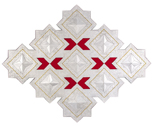Reflection of “Self” in the Mirror
The meaning of “self” with a structural nature and a segregated, disjointed, incomplete identity can only be defined in comparison with an “Other”. In this series of works, mirrors become a multifaceted context to throw us into the domain of “imaginary order” by forming a glancing “Jouissance” while keeping their constant swing between two poles of covering and uncovering. The mirrors of this series seem as metaphors and shapes exalted to a state of splendor belonging to the objects of *“mirror stage” through which subject can redefine his/her “self” through comparing those thousand-piece and repetitive details of “I”. With all their details, the mirrors drown us in “The real order”. They might be images of those things we cannot reach, of those eternal gut-wrenching losses. Mirrors are reminding us of our imaginary stage, a remembrance which is transitory like that of mirror’s reflections. The hollow spaces in some of the presented pieces are reflecting relationships in which presence of the “Other” is not filling the void left of life deprivations but even may leave a newer and deeper one in the flesh of “I”. Image of people who come over to fill the void left of life deprivations, oblivious to the fact that human, relation and deprivation can only develop a whole cycle when they are all together. This never-fulfilling will to rebound and reconstruction makes up an image and a constant “Desire” which only comes to a transitory existence in the face of a hundred pieces of mirror.
Alireza Bayat, April 2015
*The mirror stage (French: stade du miroir) is a concept in the psychoanalytic theory of Jacques Lacan. The mirror stage is based on the belief that infants recognize themselves in a mirror (literal) or other symbolic contraption which induces apperception (the turning of oneself into an object that can be viewed by the child from outside themselves) from the age of about six months.




